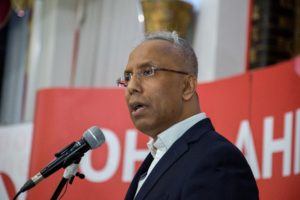 Rabbi Jonathan Romain of the Maidenhead Synagogue has written to the 832 members of his congregation urging them to vote tactically against Labour:
Rabbi Jonathan Romain of the Maidenhead Synagogue has written to the 832 members of his congregation urging them to vote tactically against Labour:
As it happens, I think he is correct in his analysis. But my concern here is not this one. Rather, it applies to what was originally a nineteenth century piece of legislation — carried over into the 1983 Representation of the People Act — and revived a few years ago concerning what is called “undue spiritual influence”.
Back in 2015, this law was used against the then mayor of Tower Hamlets, Lutfur Rahman, for apparently exerting “undue spiritual influence” on the Muslim Bangladeshi community of East London, and was one of the reasons that deputy High Court judge Richard Mawrey QC used to remove Rahman from office. It matters not that many consider Rahman to be an otherwise unsympathetic character. For this nasty — and frankly racist piece of legislation — was first introduced to counter the fear that thick and impressionable Irish peasants would use their vote to do as the Roman Catholic clergy advised them.
In 1892, the bishop of Meath, Dr Nulty, wrote to his congregants urging them to vote against “Parnellism”: “it saps at the very foundations of the Catholic faith” he wrote, in terms strongly reminiscent of Dr Romain’s letter to his community. As a consequence of Bishop Nulty’s letter, the general election result for Meath was set aside on the grounds of “undue spiritual influence”.
My interest here is not to get Dr Romain in trouble. But rather, to point out the double standards exist in the application of this law. Back in 2015, I personally commissioned an opinion from Martin Chamberlain QC — himself now recently appointed to the High Court as a judge — to challenge the interpretation of this law as applied by Richard Mawrey QC against Rahman in Erlam & Ors v Rahman & Anor (2015). Chamberlain’s opinion — read in full here — was critical of Mawrey’s judgment. Noting that freedom of expression enjoys a high degree of protection under human rights law, Chamberlain continues:
Chamberlain concludes that Mawrey “misstates and misapplies the prohibition on undue spiritual influence.” Chamberlain’s opinion was reviewed in a number of legal publications — here, for instance.
The Muslim community of Great Britain deserves to be treated the same way as other communities. Otherwise, it is hard to escape the conclusion that they are being singled out, just as Irish Roman Catholics were in the nineteenth century.
Secularists may like the idea of limiting the freedom of expression of the clergy to say what they think of the politicians of the day, but — as applied — this law continues to smack of racism.










Join the discussion
Join like minded readers that support our journalism by becoming a paid subscriber
To join the discussion in the comments, become a paid subscriber.
Join like minded readers that support our journalism, read unlimited articles and enjoy other subscriber-only benefits.
Subscribe